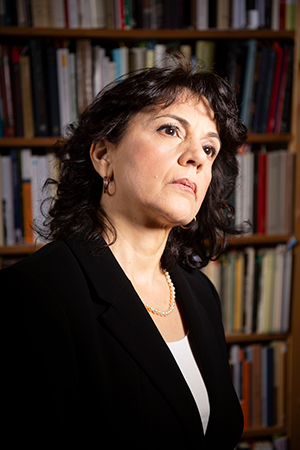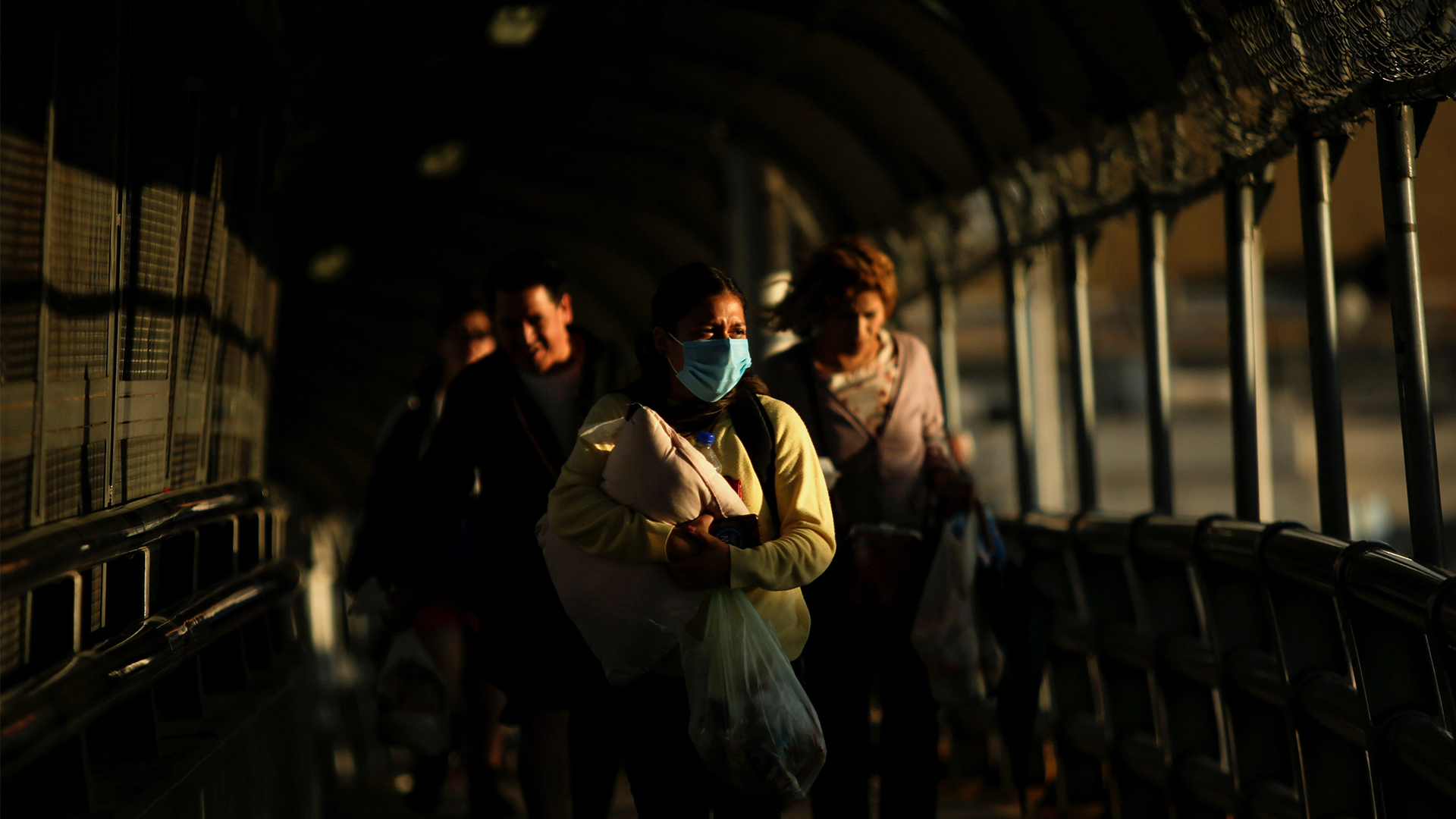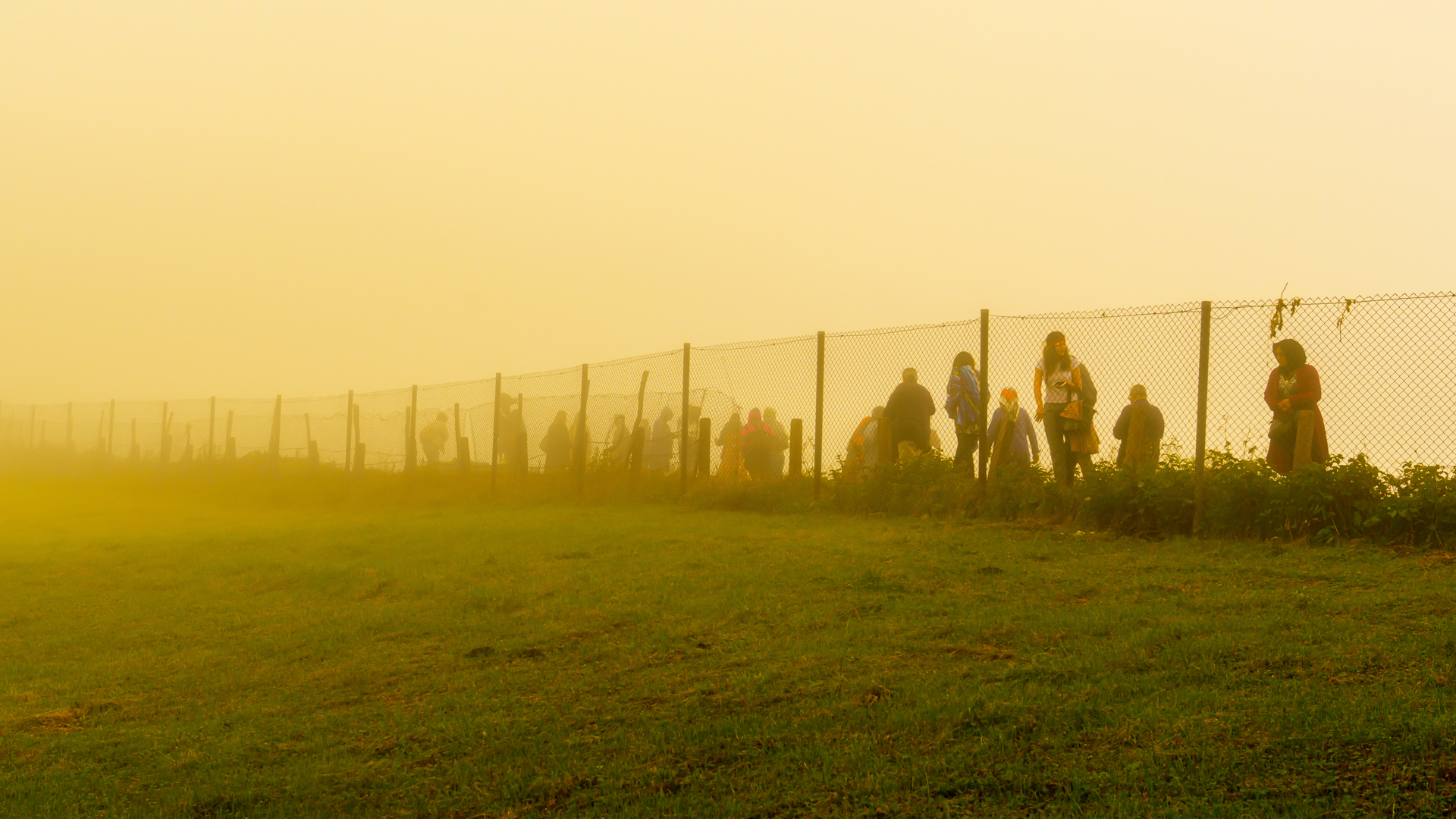Do Not Touch Me
Seeking Immunity to All Things Foreign
According to Italian author Donatella Di Cesare, a common thread that ties together current issues—from migration to racism to the coronavirus—is “foreignness.” She discussed that idea in an interview with Vision publisher David Hulme.
Donatella Di Cesare, an Italian philosopher and academic, is deeply concerned about the current state of the world. Her recent books exploring those concerns include Stranieri residenti (Resident Foreigners) and Virus sovrano? (“sovereign virus,” to be published in English by MIT Press under the title Immunodemocracy). Describing the latter volume, the publisher writes: “The violent global pandemic shows that it is impossible for us to survive if we don’t help each other. . . . When breathing can no longer be taken for granted, we need to rethink a new way of living together.”

Donatella Di Cesare is a philosophy professor at Sapienza University in Rome. Her numerous books have been translated into 11 languages.
But standing in the way of progress, says Di Cesare, are national policies that divide and separate the privileged from the Other. Such policies are the hallmark of what she calls “immunitarian democracies,” states that strive to shield themselves against all things considered foreign—from migrants to ideas/ideologies to viruses. Their motto, she suggests, is “Do not touch me.”
Going hand-in-hand with that is the concept of “sovereignism”—an ideology that glorifies independence, whether national or personal, and that often manifests itself in isolationism and an air of superiority.
As the title Virus sovrano? suggests, Di Cesare also applies the term to the novel coronavirus because it so easily bypasses patriotic walls and borders, displaying little regard for the weak and defenseless as it asserts its own superiority around the globe.
I asked her to share some thoughts on both books, and on her vision of the world after the COVID-19 pandemic subsides.
DH You’ve addressed various social issues in your writing, from torture to migration to the current coronavirus pandemic. Why these subjects and not others?
DDC I don’t believe it’s always possible to answer or account for these choices. Philosophy isn’t an abstract speculation to me. I live in my epoch of history, I am involved in it, and I feel called upon just to reflect on the great, urgent questions without pretending to give answers. Rather, I think we need to ask questions in order to broaden perspectives. For instance, the issue of violence is a classical issue, much discussed throughout the 20th century. It has recently taken on new forms that have captured my attention.
DHAre there commonalities in the themes you’ve been exploring?
DDC Certainly, though I’d rather speak of it in terms of a common thread, or several threads. And I would leave it to readers to pull them out.
I can suggest at least one example: that of foreignness. I’ve taken it up several times, and from various angles, from my book about the disturbing history of the Marranos—the Jews who were converted by force [in the Iberian Peninsula during the Middle Ages]—in which I point out what I call “the paradigm of modernity,” to the rejection of the Other in immunitarian democracies that reject migrants at the border, and even to the “sovereign virus,” which, as we know, changes life but is also a part of life.
DHWhat role does morality play in your thinking about these issues?
DDC I would say none. Morality, as a term, is not part of my philosophical vocabulary, so I practically never use it—also because it highlights analytical philosophical orientations that I have criticized on various occasions. In fact, I think that one of the great dangers these days is the depoliticization of major issues (such as democracy) that are reduced to questions of morality and individual choices, as if these issues were not eminently political matters. And by politics I do not mean governance but the ethical-political relationship that ties us to others in the polis.
DH Resident Foreigners is subtitled “A Philosophy of Migration.” How would you summarize that philosophy?
DDC There’s been no philosophical reflection on the subject of migration; it has always remained on the sidelines of philosophy, just as the figure of the migrant has remained on the margins. It’s impossible today, in the global exile that concerns everyone, not to wonder what it means to migrate.
My position is different from those who abstractly request the right to move because moving is in our DNA, without considering the state-centric nature of the world in which we live, the world that is divided into nation-states. Migration is not a biological fact but an existential and political act. It is not a simple movement but a complex exchange—that of place. It therefore takes place in the landscape where the foreigner is encountered, and thus where the ethical-political practice of hospitality begins. There is no migrating without a change (or better, exchange) of place, without the Other, and without this meeting that could, because of the place, bring about a confrontation.
This explains why the ius migrandi, the right to migrate, is far from obvious and has provoked bitter conflicts. In this sense, the ius migrandi represents one of the great challenges of the 21st century.
“The right to migrate is the human right of the new millennium—upheld by militant associations, international movements, and increasingly alert and watchful public opinion—and it will require as great a struggle as for the abolition of slavery.”
DH You say that the reader shouldn’t expect answers to questions about migration control, the distinction between refugees and economic migrants, or what successful integration of migrants into host societies looks like. Some have criticized the book as a result, saying that it’s about ideas and not practical realities. How do you counter that?
DDC I feel that one of today’s great evils is solutionism; that is, the eagerness to find good and ready solutions somewhere. The more complex the context in which we live, the more this longing increases. People don’t want to waste time thinking or reflecting. It’s no coincidence that the figure of the expert has gained so much importance in the public debate. The expert is the one who has a solution in his pocket, a proposal. This is how responsibility is taken from the citizens. The government of experts is therefore also a democratic risk.
I have no solutions in my pocket. This is not part of my job as a philosopher. I believe my contribution is to change the questions. If a question is badly put, it will always lead to the same solutions. I have tried to change the approach to the problem and to question the concept of state, of nation, but also of citizen. At present the citizen is an accomplice of the nation-state, which calls upon him to defend the borders in its war against the migrant.
Do citizens really have the right to decide who may reside with them? I distinguish between living together and residing together; we can choose with whom we live, with whom we share our home or our neighborhood, but we cannot choose who resides with us. To create confusion in this regard is a serious mistake. To lay exclusive claim to a place is discriminatory. The one performing it sets himself up as a sovereign subject who, asserting his supposed identity with that place and fantasizing his own unity with it, lays claim to property rights. This claim conceals an ancestral violence.
So why should I have to point out criteria of “control” if that word horrifies me? Why should I have to deliver recipes for “integration” if I judge that word—and I explain this in my book—to be an expression of power?

DH In Resident Foreigners you put forward a preferred model of migration based on certain Judeo-Christian principles. Why did that surface rather than a secular humanitarian model?
DDC In the book I look at three cities: Athens, Rome and Jerusalem, which are examples of three political paradigms. I don’t want to be misunderstood: these are not about religious paradigms. They’ve had repercussions for centuries, including the 20th century.
The most famous is certainly Athens, which today remains for many the model and archetype of democracy. In my book I also point out its limitations—not only because women, slaves and the so-called metecos were excluded: the biracial, the bastards, the intruders, the immigrants. This is where the idea of autochthony is born: only a man of Athenian descent, who was born on that soil and never moved, is a citizen. Here we have the ius sanguinis (law of blood) and the ius terrae (law of the soil) that were to run a long course and that found their most violent expression in the Third Reich. The myth of autochthony is extremely dangerous.
“No one is autochthonous on earth; there is always someone else who has come before us. And yet, because autochthony continues to operate in nation-states, discrimination continues.”
Rome introduced citizenship for all. Not without good reason did it become an empire, unlike Athens.
For me, however, the biblical Jerusalem is the model of a different hospitality, where there is a connection between gher, “foreigner,” and ghur, “to inhabit or reside.” By this immediate connection in the language, the foreigner is linked to dwelling, and dwelling to the foreigner. This contradicts every economy of the earth and every logic of autochthony. Not only must we welcome the stranger, but we must rethink dwelling alongside the idea of foreignness. The suggestion is not only to let the foreigners reside, but to let them reside as foreigners, acknowledging the foreignness. This is, in the end, what is meant by “resident foreigners.”
DH What changes would society need to make for the Jerusalem model to become viable today?
DDC I’m a member of the scientific and steering committee of the Italian Council for Refugees, which operates under the auspices of the UN at a national, European and North African level. In Italy a law recently passed to regularize foreign migrants—whom the right-wing government, with [deputy prime minister Matteo] Salvini in the forefront, had made illegal and thrown into hiding.
Actually, it must be stressed that the so-called closed borders of [Donald] Trump and his sovereignist colleagues are fake news. The capitalist mechanism works differently: it brings in labor that is useful for the market. And then it treats these workers as disposable, without rights. Regularizing farm hands, workers, women working in various sectors (who would otherwise be enslaved); this is the solution, but without them having to exercise the power inherent in citizenship.
DH Immigration has been a hotly debated issue around the world for a long time, of course. But this year it’s been overshadowed by the coronavirus pandemic. In Virus sovrano? you say the effects of the pandemic are multiple and complex. Why did you spotlight discrimination?
DDC The disparity between the protected and the defenseless, which challenges every idea of justice, has never been as blatant and brazen as in the crisis caused by the coronavirus. The examples are countless. Think of the homeless who have been given makeshift accommodation in an open-air parking lot in Las Vegas, like cars.
“It’s difficult to understand what’s happening if you don’t look at the recent past. The virus has exacerbated and exasperated an already established situation, which suddenly becomes clearly visible in all its darkest and most nefarious aspects.”
Seen through the lens of the virus, the democracy of the Western nations reveals itself as a system of immunity that has been operating for a long time and now progresses more openly. On one hand there are the protected, safeguarded citizens; on the other, all those who are exposed, the outcasts, the abandoned. “Immunizing” policies reject otherness, always and in all ways. The border becomes the cordon sanitaire [the protective barrier]. I don’t know, however, whether immunitarian democracy can still truthfully be called democracy.
DH If a vaccine is eventually developed, how can the world guard against its use being privileged? Some have expressed concern that many people simply won’t have access to it.
DDC This is a very important question—maybe the most important one right now. It would be a loss for everybody if the vaccine was, so to speak, “capitalized.” That would mean that again, as you say, only the privileged would have access; that is, first and foremost the citizens of the richest countries. The others would be left to the fate of death. We cannot allow that. This issue should already be on the agenda.

DH Have populism and nationalism had an impact on the crisis?
DDC The war of the nation-states against migrants, that immunitarian logic of exclusion, appears today in all its ridiculous crudeness. Nothing has kept us safe from the coronavirus, not even the patriotic walls, the arrogant and violent borders of the sovereignists. The worldwide pandemic shows the impossibility of escape—except by helping each other. That is why this event should encourage us to rethink “residing,” which is not a synonym of having or possessing but of being, existing. It does not mean being rooted in the earth but breathing the air. We have forgotten that. I have titled my book Virus sovrano? because this virus escapes, ignores, passes over confinements, moves on. It mocks a sovereignism that would have sought to grotesquely ignore it or profit from it. And it becomes the name of an unmanageable catastrophe.
“The sovereign virus passes through the air, and nobody is immune.”
But the nation-states’ xenophobia can find a pretext in the “foreign virus” for triggering a new hate campaign. This is what Trump did when he began from the start to speak of a “Chinese flu.” He continued also after the racist murder of George Floyd—perhaps in order to divert the protests to the outside.
DH You’ve also written that we’re in the throes of a second epidemic, “a psychological epidemic.” What do you mean by that?
DDC Virus-related shock causes sadness, anger, irritability, depression, insomnia. Fears multiply—fears of falling ill, becoming unemployed, being abandoned, ending up intubated; so the pandemic is a psychological emergency as well. In the public debate this is not talked about much, almost as if it were a taboo to be removed. But who decides what is vital? Everyone’s awareness is directed toward fragility and mortality. We have to stay alive, protect ourselves, defend against the organism. But the restrictions that are meant to save lives also have damaging effects on life, because they paralyze human relationships, hindering emotional contacts. In some cases the absence of other people could even be fatal. The drama of suicide is a daily occurrence.
DH How do we counter its effects?
DDC It’s now widely understood that our life will never be the same again and will be modified even in the smallest details, perhaps even globally reorganized. But the outcomes are imponderable. Presumably the imposed distance, mediated by technology, will profoundly change our way of relating to others.
DH With so many people struggling in so many ways, it sounds as though another widely quoted Judeo-Christian principle has broad application here: Love your neighbor as yourself, or treat others as you’d like to be treated. In other words, put yourself in the other person’s shoes and look for ways to help. Does that sum up your approach to the problem?
DDC Because of the pandemic, the other person is an infection, a contamination, a contagion. In a way, we can say bitterly that the cycle of civilization ends where every form of physical contact is banned by law as a source of contagion, a risk of stain and contamination. The open, spontaneous, hospitable community—gathering, playing, dancing, celebrating—seems to disappear from the civil and political horizon. The extra-national and extra-institutional community—that exuberant outpouring of the self that reaches out to the other, that exposes itself, that abandons itself—decays. How will we survive in an overprotected, regimented, shielded community?
DH How do you see the world changing as a result of the pandemic? Have we learned anything? What should we learn from it?
DDC Just as it’s impossible to decipher the secret order of catastrophes, it’s difficult to say what this pandemic will bring. That the biovirus is a last, dramatic alarm signal? That our crucial endurance is being tried once more before the final collapse? And will the signal be noticed? Will the violent pandemic be our chance to change? Until now, we could consider ourselves omnipotent among the rubble, preeminent even in destruction. This supremacy has been taken from us by a power superior to ours, and more destructive. Even the tiniest organism can dethrone us, dismiss us, undermine us. Who knows, maybe life on the planet will take new directions.
Meanwhile we have to recognize that we are not as omnipotent as we assumed. We are, in fact, extremely vulnerable. We will have to live with this virus, and maybe with others—which means living with a rediscovered co-vulnerability.


